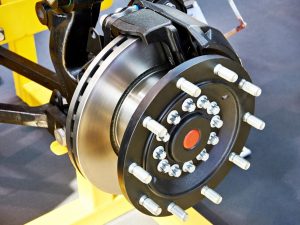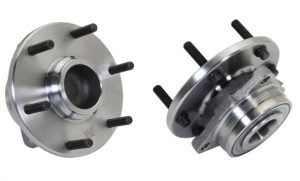Wheel bearings and hub assemblies may seem like humble components in a vehicle’s suspension and drivetrain system — yet they play a critical role in safety, performance, and efficiency. The modern automotive landscape demands bearings that meet ever-higher standards of durability, noise reduction, friction minimisation and integration with sensors and electronics. This is where precision manufacturing becomes decisive.
Why Precision Manufacturing Matters

Precision manufacturing refers to the control of tolerances, materials, machining, assembly and quality assurance throughout the production process. According to industry sources, the use of advanced CNC machining, micro-technology and stringent quality control in wheel hub bearing production is directly linked to improved vehicle performance.
Key benefits of precision manufacturing for wheel bearings include:
-
Lower friction losses → better fuel economy
-
Reduced noise and vibration → improved comfort
-
Increased durability → longer service life
-
Better integration with sensor systems (ABS, wheel speed)
-
Enhanced safety due to consistent bearing performance
Given those benefits, let’s explore how modern manufacturing practices enable them.
Critical Manufacturing Steps & Their Impact
Here is a breakdown of manufacturing steps, and why each matters for bearing performance:
| Step | What Happens | Effect on Performance |
|---|---|---|
| Material selection | High-quality alloy steels, sometimes ceramic hybrids | Ensures hardness, fatigue resistance, corrosion protection |
| Forging / blanking | Initial shaping of rings and components | Maintains structural integrity and consistent grain flow |
| Precision machining / grinding | Inner & outer races ground to tight tolerances | Minimises radial run-out, ensures smooth rotation |
| Heat treatment / case hardening | Strengthens metal surfaces | Enhances wear resistance under load |
| Surface finishing & coatings | Polishing raceways, applying protective coatings | Reduces friction and improves sealing against contaminants |
| Assembly with pre-set clearance or preload | Bearings are assembled with correct clearance and preload for application | Ensures consistent performance, prevents early failure |
| Quality control & inspection | Use of CMM, vision systems, run-out testing | Detects production variances and ensures consistency |
Each of these steps must be executed with tight control. Even small deviations in tolerance (microns) can lead to bearing irregularities = increased vibration, noise, premature wear.
Precision Manufacturing Standards and Tolerances
In bearing manufacturing, tolerance classes such as the ABEC scale or ISO equivalents define allowable deviations. For example:
-
ABEC 1 (lower precision) up to ABEC 9 (high precision)
-
For wheel bearings, tight control of radial run-out, axial clearance and preload is critical
Manufacturers of hub unit bearings emphasise advanced “precision profiles, enhanced internal geometry and super-finished raceways” to meet OE standards. The higher the precision manufacturing, the lower the friction and longer the service life.
How Precision Manufacturing Affects Vehicle Performance
Let’s identify specific ways in which precision manufacturing translates to real-world performance:
1. Lower friction & energy loss
Precision grinding and optimised preload reduce unnecessary sliding or micro-movement in the bearing. Lower friction means less parasitic loss and better fuel efficiency.
2. Noise, vibration & harshness (NVH) reduction
Tighter tolerances mean smoother rotation with less vibration, which reduces noise and contributes to driver comfort.
3. Load capacity & durability
Accurate geometry ensures load is shared evenly among rolling elements, reducing stress concentration and extending bearing life.
4. Fitment and sensor integration
Modern hub bearings often include wheel speed sensors, integrated seals and flanges — precision manufacturing ensures these integrate seamlessly.
5. Safety and reliability
A bearing produced out of tolerance may loosen, overheat, fail prematurely — precision manufacturing reduces these risks.
The Cost and Efficiency Trade-Off
Precision manufacturing demands more advanced equipment, stricter inspection, higher‐grade materials and rigorous processes. That means higher initial cost, but longer term benefits. Here’s a simplified comparison:
| Factor | Standard Bearing | Precision-Manufactured Bearing |
|---|---|---|
| Manufacturing cost | Lower | Higher |
| Tolerance level | Moderate | Very tight |
| Expected lifespan | Standard | Extended |
| Friction performance | Standard | Optimised |
| NVH performance | Standard | Superior |
| Replacement frequency | Higher | Lower |
The initial investment often pays off via fewer replacements, better performance, lower warranty claims and improved vehicle perception.
Manufacturing Advances & Trends
Precision manufacturing continues to evolve. Some of the recent trends include:
-
CNC and micro machining of complex geometries
-
Smart bearing assemblies with condition monitoring sensors
-
Application-specific surface coatings (ceramic, DLC) to extend life
-
Lean manufacturing and environmental sustainability in bearing production
Manufacturers who adopt these advanced techniques position themselves at the top of quality and performance.
What to Look for in Quality Wheel Hub & Bearing Components

For anyone replacing or upgrading wheel bearings, here is a checklist of quality indicators:
-
Correct part number for vehicle model and application
-
Manufacturer states tight tolerances and quality control (e.g., OE supplier)
-
Pre-greased and pre-set clearance bearing assemblies
-
Integrated seals, sensor compatibility and proper fitment
-
Documentation of manufacturing standards or certifications
When in doubt, investing in high-quality components is worthwhile. You can Buy Wheel Hub & Bearings online to ensure proper fitment, durability and performance.
Table: Precision Features & Their Benefit
| Precision Feature | Benefit to Vehicle |
|---|---|
| Tight radial run-out (< few microns) | Reduced vibration, longer bearing life |
| Pre‐set clearance/preload | Consistent performance under load |
| Superfinished raceways | Lower friction, improved efficiency |
| Integrated sensor / hub assembly | Easier fitment, fewer compatibility issues |
| Advanced sealing/coatings | Better resistance to contaminants and corrosion |
Conclusion
Precision manufacturing is not just a marketing buzz-word — it’s a fundamental factor that ensures modern wheel bearings perform reliably under demanding conditions. From high-strength materials and ultra-tight tolerances to integrated sensor modules and anti-friction coatings, every detail contributes to safety, comfort, durability and efficiency.
For vehicle owners, maintenance professionals or aftermarket parts buyers, understanding the role of precision manufacturing helps make better decisions. Selecting bearings produced to high standards means fewer problems, smoother driving and longer component life.
If you’re ready to upgrade or replace your hub bearing assembly, make the right choice: Buy Wheel Hub & Bearings online — choose quality, durability and the manufacturing precision your vehicle deserves.